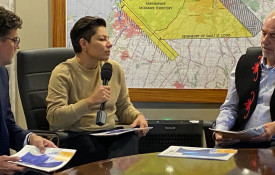Payment of the Solidarity Tax Credit - The Commission Concludes that the Obligation to Register for Direct Deposit Contravenes the Québec Charter of Human Rights and Freedoms
Montréal, November 16, 2011 - The Commission des droits de la personne et des droits de la jeunesse is demanding that Revenu Québec eliminate the obligation to register for direct deposit as a condition to obtain the solidarity tax credit, as this measure is discriminatory and infringes the right to equality.
In an opinion entitled: “Compliance with the Charter of Human Rights and Freedoms of the obligation to register for direct deposit as a condition to obtain the solidarity tax credit” released today, the Commission finds that the obligation to register for direct deposit as a condition for obtaining the solidarity tax credit compromises the right to full exercise of economic and social rights, as well of the right to dignity of persons, who do not want, or cannot, open a bank account because of their social condition, disability, national or ethnic origin.
“By imposing an obligation to register for direct deposit, thousands of persons are deprived of a benefit to which they are entitled and greatly need,” said the president of the Commission, Gaétan Cousineau.
This tax credit, which came into force on July 1, 2011, now brings together the QST credit, the property tax refund and the credit for individuals living in a northern village. Low and middle-income households are also admissible but must register for direct deposit in order to obtain it.
“Compulsory registration for direct deposit is clearly an obstacle for members of vulnerable groups,” added Mr. Cousineau.
According to the ministère des Finances of Québec, about 10% of social welfare recipients, that is 50,000 people, do not have an account in a bank or a caisse populaire (credit union), either because they do not have access to this service or refuse to do so. Although financial institutions are required under Canadian law to make bank accounts available to all who request them, persons living on social assistance are often turned down.
Moreover, opening a bank account may be too challenging for some individuals who have little education or are functionally illiterate, have reduced mobility or are socially isolated.
In its 2010-2014 strategic planning, the Commission states that, in order to ensure the economic and social development of Québec, it is imperative to ensure the full implementation of all the rights as set out in the Charter, including economic and social rights.
The Commission is urging the government to amend the Taxation Act so as to eliminate the obligation to register for direct deposit in order to obtain the solidarity credit. Moreover, the Commission is asking that Revenu Québec launch an information campaign on the solidarity tax credit targeting those who will most benefit from it.
“It is only in this way that this measure can truly qualify as a rights-based policy to fight against poverty and social exclusion,” commented Mr. Cousineau.
The Commission analyzed whether this obligation to register was in compliance with the Québec Charter of Human Rights and Freedoms, following a request by the Association coopérative d’économie familiale de l’Estrie (ACEF-Estrie).
The opinion “Compliance with the Charter of Human Rights and Freedoms and the obligation to register for the solidarity tax credit” will be available shortly on the Commission’s Website at www.cdpdj.qc.ca in the “Publications” section.
-30-
Contact:
Julie Lajoye
514 873-5146 or 1 800 361-5146 ext.230
julie.lajoye@cdpdj.qc.ca


